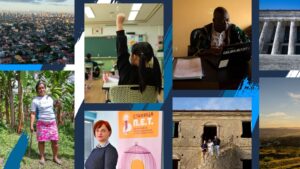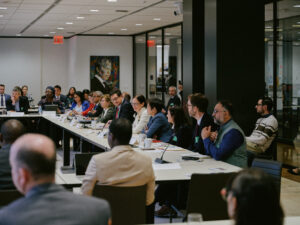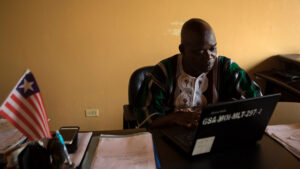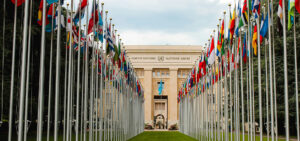Five Ways OGP’s Multi-Stakeholder Model Can Deliver the Global Digital Compact
The Global Digital Compact commits governments to making the digital space safe, inclusive, equitable, socially focused, and secure. Adopted by world leaders in September 2024 during the UN’s Summit for the Future, it emphasizes the importance of multi-stakeholder collaboration to achieve meaningful results. For countries in the Open Government Partnership (OGP), that sentence should sound very familiar—that’s our model and we know it works.
Let’s take a deeper look at what’s inside the Compact and how it aligns with the work OGP members are doing.
About the Global Digital Compact
The Global Digital Compact sets out five objectives
- closing all digital divides and accelerating progress across the SDGs,
- ensuring that benefits from the digital economy reach everyone,
- fostering an open, safe, and secure digital space that respects human rightsAn essential part of open government includes protecting the sacred freedoms and rights of all citizens, including the most vulnerable groups, and holding those who violate human rights accountable. T...,
- advancing responsible and equitable data governance approaches, and
- enhancing international governance of artificial intelligence (AI) and emerging technologies.
Global governance is important, but needs to be translated into meaningful country-owned reforms to ensure the benefits of digital technologies are maximized for all people. The Global Digital Compact supports this—each of the objectives described above come with actionable sub-commitments that can and will be measured, encouraging signatories to move beyond lofty ethical principles and towards tangible action. Many of these action points align with reforms OGP countries have committed to in this field. The examples below make the Compact’s objectives real in a multi-stakeholder and independently reviewed manner.
How the Compact Aligns with Reforms by OGP Members
Opening Data for All (Objective 1, Section 17a)
Signatories commit to developing, disseminating, and maintaining safe and secure open data and open standards that benefit society as a whole. Through OGP, countries have opened data for the purposes of improving climate-driven transitions, preventing and fighting corruption, and strengthening support resources for people with disabilities. Buenos Aires (Argentina) institutionalized the development of open data, creating a data and evaluation coordination unit within government that ensured local data was gathered, updated, and shared in ways that met the needs of residents in a vulnerable community. This project directly involved citizens in the planning, collection, and monitoring of open dataBy opening up data and making it sharable and reusable, governments can enable informed debate, better decision making, and the development of innovative new services. Technical specifications: Polici....
Aligning Digital Legislation with International Law and International Human Rights Law (Objective 2, Sections A and B)
Signatories commit to ensuring that the development and implementation of digital legislation is compliant with international law and international human rights law. Signatories must also establish appropriate safeguards to prevent adverse impacts on human rights. The Netherlands has already put this into practice through its 2020–2022 OGP action plan by developing a human rights impact assessment on the use and procurement of algorithms in government.
Addressing Information Integrity (Objective 3, Section 35a)
Signatories agree to design and roll out digital media and information literacy curricula to ensure that all users have the skills and knowledge to safely and critically interact with content. Another key priority is the commitment to enhance resilience against the harmful impacts of misinformation and disinformation. OGP is a tried and true mechanism for operationalizing these types of commitments, with reform guidance in this area outlined in the Open Gov Guide.
In France, a new program is upskilling citizens to understand how to protect their data and identify disinformation when they see it online. Australia is partnering with the Federation of Ethnic Communities’ Councils of Australia to improve media literacy in culturally and linguistically diverse communities, reducing their vulnerability to the harms of false narratives. In Ghana, government and civil society are planning a range of strategies to tackle disinformation, including media literacy and fact checking programs, as well as conducting a human rights assessment of legislationCreating and passing legislation is one of the most effective ways of ensuring open government reforms have long-lasting effects on government practices. Technical specifications: Act of creating or r... on misinformation and disinformation to ensure the protection of fundamental freedoms.
Ensuring Data Privacy (Objective 4, Section 39c and 42b)
Signatories agree to empower individuals with the ability to give and withdraw their consent to the use of their data and ability to choose how those data are used. The Netherlands are beginning to tackle this issue by conducting research into methods that will inform citizens about their data privacy rights under the existing Privacy Act and clarifying how technical tools and new data governance structures could empower individuals to fully exercise those rights.
The Compact also includes a commitment to develop common definitions and standards on the use and reuse of data for public benefit, a key indicator for all SDGs. Chile is developing and implementing a toolkit for the public sector to reconcile the availability of open data with the protection of personal data. This develops a “privacy by design” data standard by which they can then safely open, use, and reuse data for the public benefit.
Maximize the Benefits of AI while Mitigating its Risks (Objective 5)
Signatories commit to advancing equitable and inclusive approaches to harnessing the benefits of AI while mitigating its risks in full respect of international law. Uruguay is doing just this, with an OGP commitment that creates an Artificial Intelligence Observatory to promote and encourage the ethical, safe, and reliable use of this technology. The observatory will facilitate access to information on state AI applications and monitor action items in the national AI and Data strategies.
Conclusion
With the launch of the Global Digital Compact, the clock is ticking to implement its goals in time for the conclusion of the SDGs in 2030. As signatories look to the future, they can take inspiration from OGP’s model of multi-stakeholder collaboration to implement reforms, especially by using resources like the Open Gov Guide chapters on digital governance. We encourage OGP members to draw on these sources of innovation and inspiration, and use the Open Gov Challenge on digital governanceAs evolving technologies present new opportunities for governments and citizens to advance openness and accountability, OGP participating governments are working to create policies that deal with the ... More to translate the principles of the Global Digital Compact into impactful domestic reforms.
No comments yet
Related Content

Open Gov Guide
The Open Gov Guide is the go-to resource for officials, civil society representatives, and other actors looking for recommendations, examples, and resources on open government.

The Future is Open: OGP at UNGA
In September 2024, the Open Government Partnership and the Ford Foundation convened more than 60 global open government leaders from government, civil society, and international organizations for an OGP Leaders…

How to Advance Digital Governance Reform through the Open Gov Challenge
Learn how the Challenge can advance digital governance reforms and what members are doing to raise ambition.


Leave a Reply